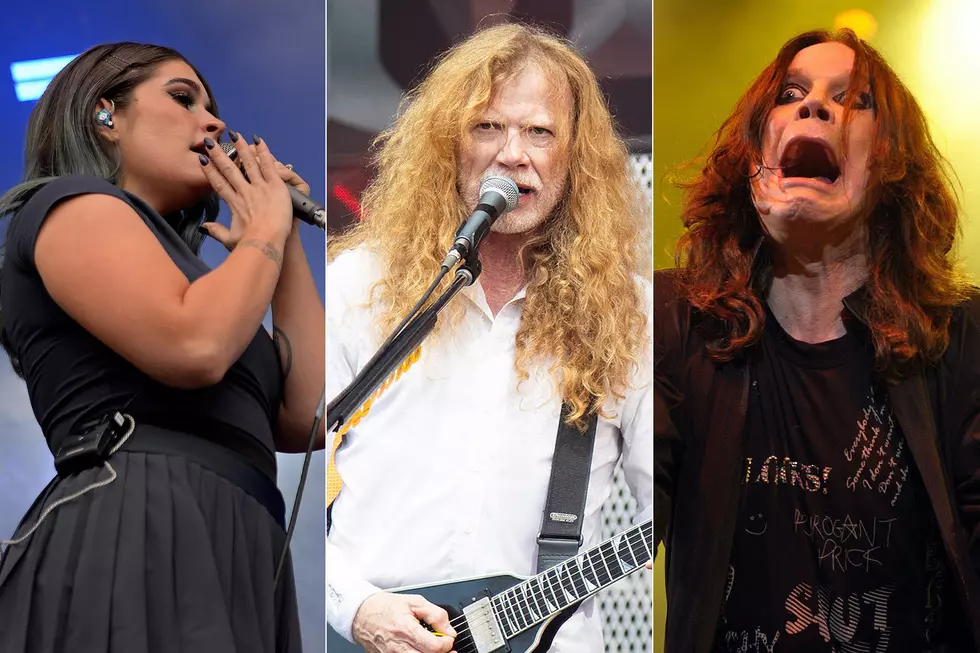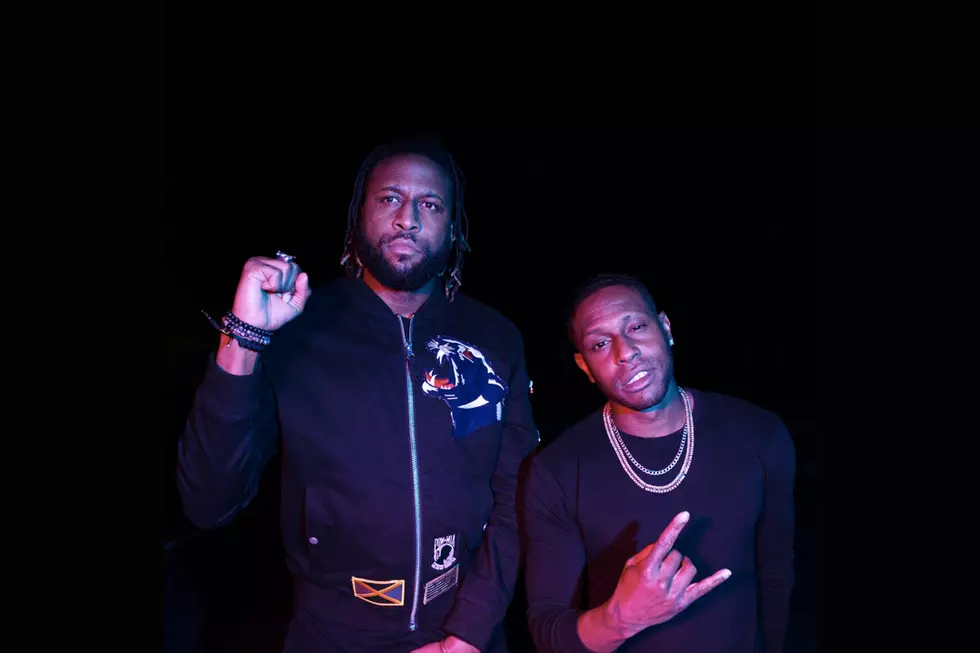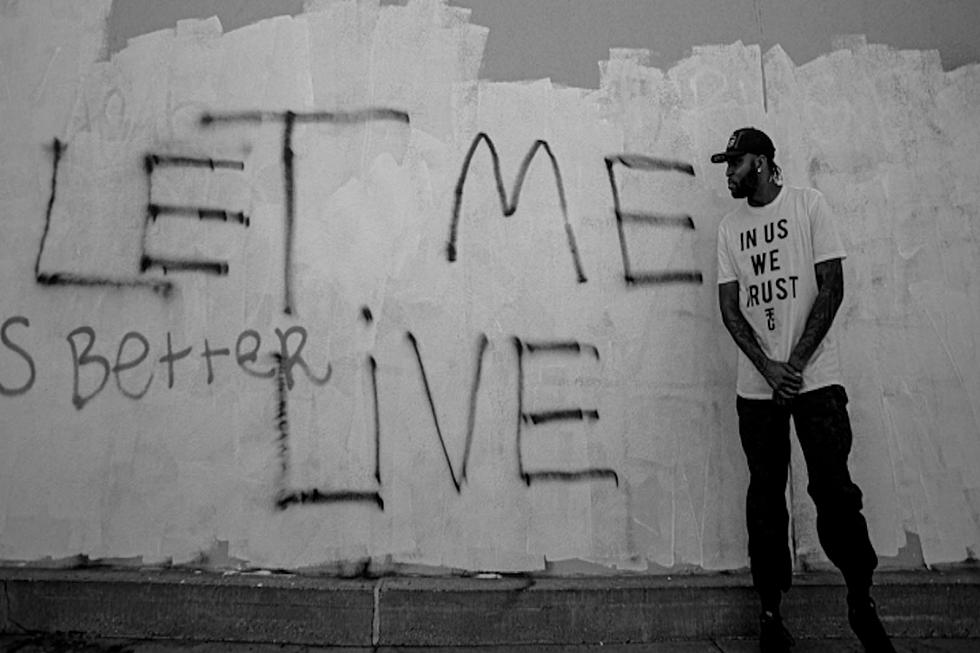
Op-Ed: Fire From the Gods Singer Details The 8 Minutes + 46 Seconds That Changed the World
Fire From the Gods just released their "Break the Cycle" video earlier this week in honor of Juneteenth, marking the end of slavery in the United States. The clip centers on some of the issues people of color still face to day in America due to systemic racism.
Some of the video includes footage from Fire From the Gods' own Akil “AJ” Channer, who traveled both to Minneapolis and Atlanta to take part in the recent protests in the wake of George Floyd's death. All of Channer's recent travels will eventually be made into a docuseries on the current state of the world. The moving footage takes you to the streets of Minneapolis and Atlanta days after the murder of George Floyd, focusing on why the system is set up to fail while investigating how we can change that as one united body. AJ interviews protestors on the ground, community leaders and other local artists to showcase the power of strength in community, and how we, as a country, can move forward.
Today (June 19) as we've reached the annual Juneteenth commemoration, Channer has penned an op-ed for Loudwire on the "8 Minutes + 46 Seconds That Changed the World," and provided a photo gallery from his visits to Minneapolis and Atlanta. Read his words and view his images below.
Break The Cycle: The 8 Minutes + 46 Seconds That Changed the World
Has the world gone completely mad or have our eyes finally been forced open? Black, white, brown, yellow, red — these are skin colors, but have become a system by which we divide ourselves. The race issue in the United States has always been the proverbial elephant in the room. From the founding of this nation, all the way to where we are right now, racism has always been a systemic, institutionalized problem. We are now at a place where it has completely engulfed our lives. It is so pervasive and engrained in American society that when systemic racism is called into question, people actually behave as if you are protesting and questioning America herself. Are we?
The death of George Floyd at the hands of the police has, yet again, shed light on the excessive force issue in departments throughout the country. Upon seeing the video from that fateful day in Minneapolis, one might ask themself, “Well, what else is new?” The answer is ABSOLUTELY NOTHING. Throughout the decade, video after video of law enforcement brutally taking the lives of black men and women has gone viral. But something is different this time. The people have had enough.
On May 26, Minneapolis erupted. I sat in my home in Austin and followed various social media live feeds showing the outrage, and visceral emotional response of the people. Whether the protesting was violent or peaceful, the people were finally making their voices heard. I observed the Michael Brown and Ferguson protests from the sidelines, but that Thursday night, on the 26th of May, I made up my mind. I was not going to just sit at home and watch the country descend into chaos once more.
The Monday after the protests, I packed a bag and, with a videographer by my side, set off for Minneapolis. What we found was a city in recovery, a city in mourning in full view of the world. We also encountered press and news outlets from everywhere. The media has created this massive chasm between the peoples of the world, especially in the United States. Media coverage creates adversaries for its narrative. It feels as if we, the people, are a ball in a tennis match being volleyed back and forth between the media and the government. My immediate thought was that Fire From the Gods had to tell this story from an unbiased, objective viewpoint while giving the people a voice.
I have seen extraordinary things in my life. I've seen bullet holes and bombed out buildings in Jerusalem, a refugee camp in Ghana, abject poverty and suffering, but none of that struck me like the aftermath of Minneapolis. The destroyed and looted Target looked like a ghost town. The graffiti written on it were the words of a generation begging to be heard. Phrases like "Let me live,” "Respect my skin," "Please stop killing us."
That is heartbreaking. In the land of the so-called free, our youth are in revolt because they fear for their lives. That is striking to say the least. There were families visiting the corner where George Floyd was killed. Not because of the allure of the area, but because parents took their children there to learn.
We were able to watch Terrence Floyd's press conference in person. We watched him grieve in plain view for all to see. He had to share what should have been a private moment with the world. Instead, every news agency under the sun watched in dead silence with their lens pointed at Terrence Floyd while he stood in front of the corner-turned-memorial, tears in his eyes. All you could hear was the breaking of glass as cameramen were stepping on the objects people had laid in the street to mourn his brother, just for a glimpse of this man's grief. It was awful.
Everyone was shouting, "media get back let him breathe, let him mourn." It was quite a bit to take in. The city had fully mobilized. I was able to stop by a local Jamaican Restaurant called Pimento Kitchen who, despite social distancing, opened their doors as a community refuge. They provided groceries and a makeshift community watch because all the local shops were closed.
The use of excessive force in the U.S. has reached a critical point – look at what happened right after we left Atlanta with Rayshard Brooks. It's not the only factor in the systemic institutional problem of racism and classism in America. From healthcare, to the vast gap between the rich and poor, all the way to the beleaguered educational system, racial discrimination rears its ugly head in people’s circumstances.
Minneapolis is no different then any of the other crumbling cities of the “great” republic that is the USA. The city was full of broken hearts and burned out buildings. No building stood out to me like that of the 3rd Precinct. What was supposed to be a haven of security and safety looked to me like the fortress of a foreign occupying force. When speaking to the citizens of the city, they had the same impression. “The police treat us like we are not Americans and furthermore they treat us as if we aren’t human.” When in Atlanta, I witnessed a protest at the capitol building. "The Confederate statue there is a monument to racism," people said of the way it made them feel. The open display of confederate statues, cited by some as symbols of Southern Heritage, were introduced into the mainstream in the mid to late 1900s as a symbol of racial segregation and racial superiority. In a society that claims equality and freedom to be its pillars, we have to address this issue. It's our duty as a nation to do so.
Across America, law enforcement agencies are in many cases overwhelmingly white and underwhelmingly racially integrated. Those policing it are not a part of the neighborhood in which they work. This poses an interesting question: How can we effectively police or be policed if both parties involved feel they don’t understand each other? You would think it was as easy as saying, “Not all cops are racist or bad and not all black peoples from marginalized communities are criminals.” But it isn’t. Because situations like that of George Floyd’s in Minneapolis prove that there is a massive disconnect between police and the communities that they police, which inevitably leads to violent encounters between law enforcement and citizens. The statistics, numbers and “facts” that are used to refute this are heavily steeped in racially biased rhetoric. History has provided enough evidence to back this claim.
The George Floyd murder has sent shockwaves throughout the world. There have been protests in 50 states, and 13 different countries. People from all walks of life are making sure this one message is truly heard.
It is time to break the cycle of perpetual violence, discrimination and hatred. I firmly believe that education is a major key in stopping us from repeating the past. And I am not just talking about scholastic achievement, but also about educating our youth on how to respect each other. Ultimately teaching them the value of each of our lives. Justice for George Floyd, Breonna Taylor or Ahmaud Arbery and police reform are but small victories in the fight for understanding.
The whole system is infected. The imperative is to break the cycle. It is not with the police that I quarrel, but it is with the system that has enabled and supported racism. Neither Black people, nor White people are going anywhere. We are going to have to occupy this earth together. So, I leave you with this — “I don’t need you to love me nor do I need you to like me. Just respect my right to exist.”
-Akil “AJ” Channer.
Fire From the Gods, "Break the Cycle"
Fire From the Gods' Akil "AJ" Channer George Floyd Protest Photo Gallery
More From KZCD-FM










